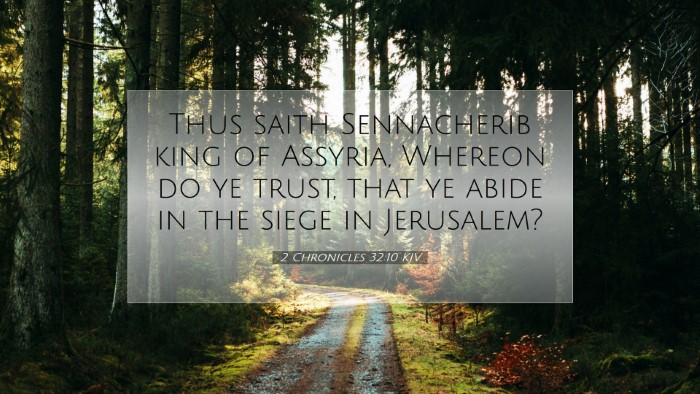2 Chronicles 32:10 - Commentary
Verse (2 Chronicles 32:10): “Thus saith Sennacherib king of Assyria, Whereon do ye trust, that ye abide in the siege in Jerusalem?”
Introduction
This verse occurs in the broader narrative of the Assyrian siege of Jerusalem during the reign of King Hezekiah. Sennacherib, the king of Assyria, sends his representatives to intimidate and challenge the Jewish people regarding their trust in God. The historical context is significant, as it frames a moment of intense spiritual conflict.
Overview of Commentaries
Through the insights of Matthew Henry, Albert Barnes, and Adam Clarke, we will explore the various themes and applications presented in this pivotal verse.
Historical Context
Sennacherib's campaign against Judah, as chronicled in this chapter, reveals the Assyrians' aggressive expansion and the subsequent threat that Jerusalem faced. Sennacherib’s audacity to question the faith of the Israelites illustrates the psychological warfare employed by ancient conquerors.
Matthew Henry's Insights
Matthew Henry emphasizes the confidence and arrogance of Sennacherib as he bluntly challenges the inhabitants of Jerusalem. Henry notes:
- Assurance of Victory: Sennacherib's words reflect a tyrant's certainty that Jerusalem’s defenses would not hold against his might.
- Questioning Trust: The king prompts a significant question about where true trust lies, highlighting the contrast between human strength and divine protection.
He further elaborates that this challenge causes the people to reflect inwardly on their reliance on God amidst daunting circumstances. Henry skillfully navigates the reader to consider the nature of true faith amid trials.
Albert Barnes’ Perspective
Albert Barnes provides a more detailed historical analysis of Sennacherib's remarks. He points out:
- Doubt and Despair: Barnes classifies Sennacherib's communication as an attempt to instill doubt and despair among the people of Jerusalem.
- Spiritual Implications: He connects the siege to a broader spiritual dialogue, insinuating that the boasts of Sennacherib display the foolishness of opposing God’s will.
Barnes asserts that the king's arrogance ultimately serves as a backdrop for God's providential plans to rescue His people, reinforcing the notion that God often works through the darkest of trials.
Adam Clarke's Commentary
Adam Clarke offers a profound theological reflection on the verse, stating:
- Trust in God Made Manifest: Clarke magnifies the essence of faith in overcoming external threats, prompting believers to reflect on their spiritual foundation.
- Call to Prayer: He suggests that this moment is not merely a crisis of military might but a call to prayer and dependence on divine support.
Clarke's writing emphasizes the importance of community prayer and reliance on God during times of adversity, something that resonates with both leaders and congregants in today’s context.
Theological Insights
Each commentary underlines the theological implications of placing trust in God versus human fortresses. The challenge posed by Sennacherib becomes a lens through which believers view the trials of faith.
Faith in Adversity
This verse invites an exploration of the theme of faith under pressure. Believers are often confronted with trials that seem insurmountable, much like the siege of Jerusalem. This serves as both a historical account and a spiritual lesson.
The Role of Leadership
Hezekiah's leadership, coupled with the collective faith of the people, illustrates the significance of both individual and corporate trust in God. The responses to Sennacherib's threats reflect the broader Christian understanding of community reliance on God.
Application for Believers
- Trust in Difficult Times: The verse encourages believers to meditate on who they trust during tumultuous seasons in life.
- Community Engagement: It emphasizes the necessity of coming together in prayer and support when faced with spiritual warfare.
- Confidence in God’s Sovereignty: Understanding historical precedents can bolster contemporary believers’ confidence that God is always able to deliver, regardless of the odds.
Conclusion
In summary, 2 Chronicles 32:10 serves not only as a historical account but also as a theological invitation to reflect on trust amidst adversity. Through the insights of Matthew Henry, Albert Barnes, and Adam Clarke, we are reminded of the sovereignty of God, the importance of spiritual leaders, and the vital role community plays in sustaining faith during crises. The question posed by Sennacherib resounds throughout the ages, urging believers to reaffirm their trust in God’s unyielding strength. This commentary enriches the understanding for pastors, students, and scholars as they apply these timeless truths in their contexts.


